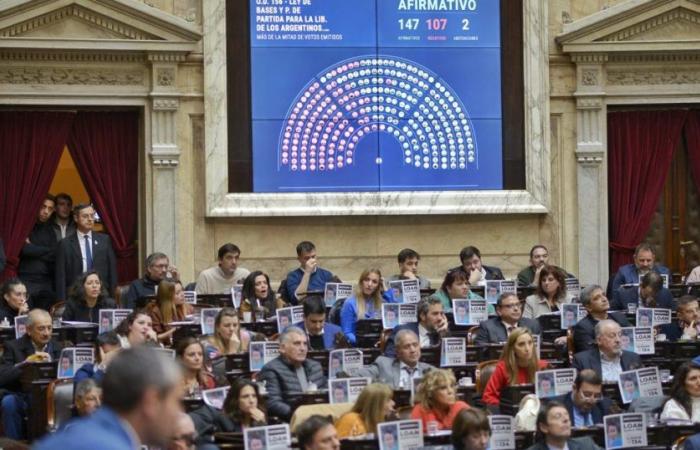After learning that the Chamber of Deputies approved the draft Law Bases that restores the Income Tax to workers and retirees, The main changes and their impact on wages are beginning to be seen.
First of all, it is worth mentioning one of the guiding principles established by the law, based on the fact that Everything related to Earnings will be as provided by this law..
This would mean that “The provisions contained in any type of general, special or statutory laws, decrees, collective labor agreements or any other convention or regulation will not be applicable.by which the exemption, relief, exclusion, reduction or deduction, total or partial, of the tax is established.”
- $1,380,000
- Net remuneration from which a single worker without children will pay income tax.
In effect, upon reestablishing the progressive scale of the tax and personal deductions, according to those presented, a single worker without children would be taxed on earnings as long as his net remuneration is greater than $1,380,000. While, A worker with dependents of a spouse and two children would pay a net salary of more than $1,829,000.
In practical terms, the scope of the regulations implies that:
1) The non-taxable minimum based on 15 vital and mobile minimum wages is eliminated, and restores a single scale for all dependent workers;
2) The exemption from the annual supplementary salary (SAC), productivity bonuses, cash shortages and concepts of a similar nature is eliminated;
3) It removes the exemptions from hierarchical or functional responsibility, representation expenses, uprooting, extra charges for remote areas, etc.
4) The exemption that applied to the differential between 100% overtime and the normal hourly rate is eliminated.
5) HE eliminates the additional deduction for unfavorable areas of 22% owned by workers or retirees who live in the Patagonian region.
6) In the field healththe exemption on mandatory guard duty items, whether active or passive, and overtime, performed by professionals, technicians, assistants and operational staff of health systems is eliminated.
7) As to Public employeesthe provisions contained in any type of law – general, special or statutory – will not be applicable, on which the benefits that they may have fall under the scope of provincial laws and/or for example Law 24,686 for the benefit of the legislative power.
8) Regarding the exception for private tankersthe deductions granted to employees of the oil activity have a particular treatment, while maintaining the exemptions of Law 26,176, but with cuts within their reach. The project incorporates the figure of “well personnel” as the sole subject for the scope of Law 26,176.. Said subject will be the one who usually and directly performs a) in oil or gas exploration carried out in the campaign and b) in tasks performed at the wellhead and affected by the drilling, completion, maintenance and repair of oil or gas wells. This implies that all personnel not included in the previous definition would be left without benefits and therefore fully covered by the tax, even if they are within the CCT of the oil activity.
Constitutionalists warn that this situation clearly affects the treatment indicated in the National Constitution.
From what has been said, we can conclude that The effects of the gains will be total for the population who will receive less pocket money.
Since the Senate rejected the changes in profits, while when it returned to the House of Representatives it was approved without modifications, constitutionalists warn that this situation clearly affects the treatment indicated by the National Constitution.
“In a federal bicameral system, the central element of the process of formation and sanction of laws is the affirmative will through which a bill is approved. Only the affirmative concurrence of the Chamber of Deputies and the Chamber of Senators can transform a bill into a law sanctioned by Congress. A partial rejection by the reviewing Chamber can never be compared to an approval with additions or corrections because it lacks affirmative will.” said Andrés Gil Domínguez.
Given this, we foresee at least two possible scenarios.: that companies, in their capacity as withholding agents, receive the demands of their workers (affectation of food wages), or that the Federal Public Revenue Administration (AFIP) is forced to decide on a highly sensitive issue.
* CHINNI, SELEME, BUGNER AND ASOC.








